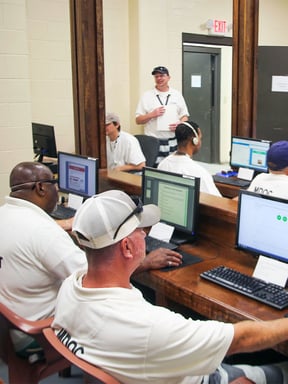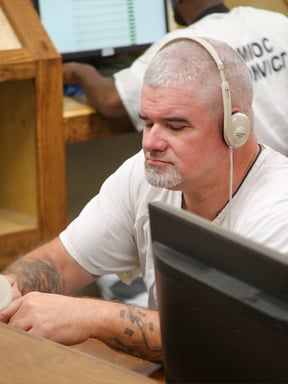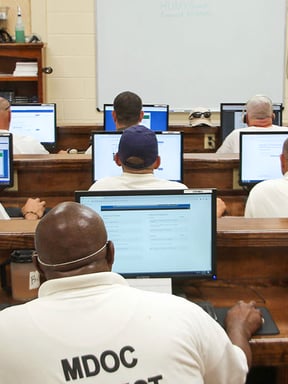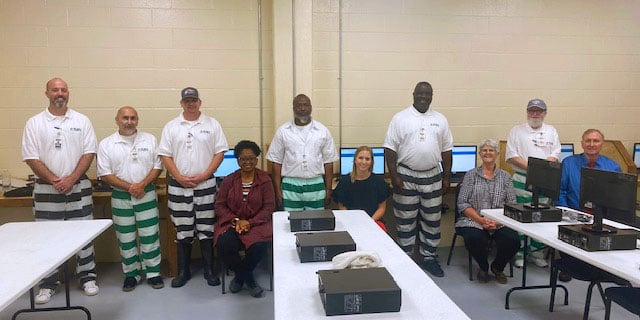CTE Curriculum
Prepare learners with CTE curriculum aligned to industry standards.
Case Study
Challenging the Narrative: How CTE Impacts Today's Correctional Facilities
As Robert rolls out of bed, yawning and stretching, he slowly but surely starts his day the same way he does every day. He brushes his teeth, gets dressed and eats breakfast before heading off to class in a hurry. As he makes his way down the hall and into the classroom, he finds his seat and gets settled just as the lesson begins and the hum of students chatting slowly fades out.
Chances are Robert’s story sounds similar to how you spent your mornings going to school as a young learner. The only difference is Robert is incarcerated.
In the United States prison system, the need for correctional education programs aimed at equipping inmates with employability skills and opportunities to prepare for reintroduction is more real than ever before.
With issues like overpopulation of facilities and repeat offenders, Career and Technical Education (CTE) offers today’s correctional facilities an effective way to combat these issues and set inmates on a path of personal and professional success.
The Incarcerated Veterans Program: HUMV
Located in Rankin County, Mississippi, the Central Mississippi Correctional Facility (CMCF) might look like your everyday correctional facility. But for a group of veterans working toward re-entering society, this facility offers an opportunity for a brighter, more sustainable future.
Established in 1986, the CMCF houses over 4,000 inmates, including 90 men who participate in the Mississippi Statewide Incarcerated Veterans Program’s Housing Unit for Military Veterans (HUMV).
The Incarcerated Veterans Program was established in 2016 to address some of the most persistent problems among incarcerated veterans, including recidivism, homelessness, substance abuse and mental health. The program utilizes counseling and job training to prepare veterans to re-enter society sustainably.
“When we think about correctional facilities we often focus on the crime and the sentence of the inmate rather than why they are truly here,” said B.R Hawkins, Director of Mississippi’s Statewide Incarcerated Veterans Program. “Rehabilitation is at the forefront of everything we do.”
For an inmate to qualify for the program they cannot have been dishonorably discharged from their branch of the military and must have less than 18 months remaining of their sentence.
“This idea of locking people up and throwing away the key, that most people have when it comes to prison, isn’t how we fix the issue of incarceration,” said Hawkins. “It takes giving them the same opportunity we all have every day to better ourselves.”
When a veteran is accepted into the program, they must first complete the HUM-V Community Introduction, a selected set of courses designed to foster reconciliation and accountability by enhancing inmates' mental health and self-esteem.

When asked if veterans serving a life sentence could participate in the program, Hawkins said “I turn them into teachers, and they lead our classes!”
Courses in the HUMV introductory section of the program include: Maintaining Positive Relationships, Impact of Nutrition on Health & Wellness, Financial Literacy and Decision Making amongst others. These courses develop valuable soft skills and interpersonal skills necessary for successful reintroduction into society and the modern workplace.
“There are many contributing factors as to why these men are in prison,” said Hawkins. “Our motto is that we can’t undo the things that were done. What matters is what we do next. By offering inmates access to education and skills development we’re making sure what they do next really matters.”

By allowing the veterans to work through coursework independently, CMCF is allowing them the time and space to fully invest in themselves and their learning.
Following the HUM-V Introduction, the veterans then move into Career and Technical Education (CTE) courses offered through iCEV. iCEV is a CTE curriculum provider for 11 subject areas and hosts 16 industry certifications on its platform. iCEV’s vast curriculum library provides access to consistently updated information and resources developed alongside industry leaders and professionals to reflect today’s workforce needs.
Elective courses in the HUMV program include agriculture science, architecture & construction, business, family & consumer science, health science, automotive as well as career exploration. As a result of iCEV’s flexible platform and curriculum resources, veterans within the program are able to select any course or subject area that interests them to pursue independently, at their own pace.
“Not very many inmates in the U.S. prison system get to experience the type of program these veterans are experiencing and that has to change,” said Clayton Franklin, Chief Product Officer at iCEV, “If we expect them to leave their time incarcerated ready to be productive members of society, we have to give them the tools to be successful.”
By partnering the HUMV with iCEV’s curriculum solutions, the CMCF isn’t just giving these individuals the opportunity to learn. They’re giving them the tools they need to forge their own path to success.
Challenging the Narrative
One of the best ways we can transform the narrative of an individual’s time spent incarcerated is to make meaningful education opportunities available to continue developing their knowledge and skills.
Imagine a world where every incarcerated person came home with transferable skills and a pathway to meaningful employment. That’s when the trajectory of these individuals changes from the stigmatizing mark of a criminal record to a world of opportunity.
“Being incarcerated can put you in a dark place when everyone outside is expecting you to do nothing but just sit in here and wait to be released,” said Robert. “Taking these courses and earning certifications has given us hope which I think is changing the culture of how we see our time in here and how people view us when we get released,”
For veterans participating in the program, the opportunity to learn is just the tip of the iceberg when it comes to how this program is changing lives.
“We’re actually working to be able to present our coursework and certifications to the parole board, so they have more to look at than just our inmate charts and sentencing information,” said Paul, a facilitator in the program. “It gives the board the ability to see the hard work we’re putting in to better ourselves.”
The Incarcerated Veterans Program gives these individuals not only the opportunity to develop valuable knowledge and skills for today’s workforce but also gives them a built-in advocacy tool.
Veterans in the program are given free rein of which courses to take to truly give them the opportunity to gain a wide range of skills while exploring diverse industries and careers that interest them.

With 11 subject areas, each veteran is able to lean into their own interests to gain knowledge and skills through iCEV’s curriculum.
“I didn’t even know I was interested in working with animals until I started exploring careers through iCEV and took the animal science course,” said Paul, “And now here I am Elanco Fundamentals of Animal Science certified hoping to get a job working with animals!”
Curriculum and resources offered by iCEV are developed using state and national CTE standards and use industry leaders and professional insights to best reflect the needs of real-world career expectations.
“Bringing iCEV into our program changed everything for our veterans,” said Hawkins. “The curriculum is engaging and the platform brings the same type of classroom experiences other students are having into our correctional facility.”
Through this partnership iCEV, CMCF and Hawkins worked together to ensure the online security needs of the facility remain a priority while simultaneously providing a digital-based curriculum.
The CMCF has seen immense changes in a variety of areas as a result of their partnership with iCEV. By providing access to high-quality employability and technical skills development the efforts of BR and CMCF are changing the narrative for these veterans.
“Something I think the general public needs to know is yes these guys did something bad to get here, but they are not bad people,” said Hawkins. “They deserve the same opportunity to learn, grow and better themselves that we all have every day.”
Why Correctional Education Matters
In pursuit of changing the narrative for correctional facilities and inspiring others to implement programs like the Incarcerated Veterans Program, it’s important to know the benefits that come with high-quality correctional education.
In today’s modern prison system, one of the most prevalent issues is recidivism. “Recidivism is a relapse in behavior after having been released from prison that leads to re-incarceration,” said Hawkins.
The national recidivism rate in the United States is 44%, meaning out of 100 released inmates 44 return to prison on average. While Mississippi’s overall recidivism rate for its six state prisons is 38%, the Incarcerated Veterans Program has a 9% recidivism rate as a result of the personal and professional development opportunities available to inmates.
Correctional education is also highly cost-effective. As recidivism rates decreased at CMCF, “the annual estimated cost benefit to the state was $518,952 as fewer released inmates returned” said Hawkins.
In 2021, the Incarcerated Veterans Program also had a 60% workforce placement rate for veterans completing the program. Of the veterans not returning to prison, 72 were placed into the workforce.

When two passionate organizations come together, like CMCF and iCEV not only do they positively influence the veterans in the program but they also lead the charge for changing the educational landscape for incarcerated individuals.
There are increased employment opportunities available for those formerly incarcerated individuals who engaged in correctional education programs, and reentry is far smoother and more successful for those who took classes or earned certifications.
By focusing the Incarcerated Veterans Program’s efforts on CTE and personal development, Hawkins and the CMCF are not only setting these veterans on a path for personal and professional success but are also setting an example for other correctional facilities across the nation.
“Learning is an invaluable lifelong skill that changes lives,” said Hawkins. For the participants of the Incarcerated Veterans Program, career and technical education is the key to a brighter, more sustainable future.
To learn more about correctional education or to explore how iCEV’s curriculum solution might fit into your correctional facility contact Landee Thorn, Higher Ed & Correctional Consultant for more information.
About iCEV
Since 1984, iCEV has specialized in providing quality CTE curriculum and educational resources. iCEV is the most comprehensive online resource for CTE educators and students, offering curriculum for several major subject areas, including agricultural science, trade & industrial education, business & marketing, career exploration, family & consumer science, trade & health science, law enforcement and STEM education. iCEV also acts as a certification testing platform for industry certifications. Recognized companies and organizations utilize iCEV as the testing platform for their certifications. Additionally, iCEV offers Eduthings, a CTE data management platform that simplifies reporting for industry certifications, work-based learning, CTSO participation, and more. For more information, visit www.icevonline.com.



